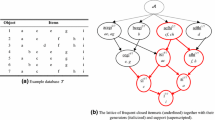Abstract
Any algorithm for mining association rules must discover the set of all maximal frequent itemsets (maxL) from a database. Given a set of itemsets X, to verify that X is maxL, two conditions must be checked: (1) any itemset x in X is frequent, and (2) the dual of X must be the set of all minimal infrequent itemsets (minS). This observation leads us to a family of algorithms for mining association rules. Given a reasonable guess of minS and maxL, we verify their duality relationship, and refine the two sets until the above two conditions hold. We note that previously proposed algorithms such as Apriori and Pincer-Search are all members of our algorithm family. Also, we study a member algorithm called FlipFlop. Through a series of experiments, we show that FlipFlop significantly reduces the I/O requirement of mining association rules.
Access this chapter
Tax calculation will be finalised at checkout
Purchases are for personal use only
Preview
Unable to display preview. Download preview PDF.
Similar content being viewed by others
References
Charu C. Aggarwal and Philip S. Yu. Data mining techniques for associations, clustering and classification. In Proc. of the 3rd PAKDD Conference, Bei**g, 1999.
R. Agrawal, T. Imielinski, and A. Swami. Mining association rules between sets of items in large databases. In Proc. ACM SIGMOD, Washington, D.C., May 1993.
R. Agrawal and R. Srikant. Fast algorithms for mining association rules in large databases. In Proc. of the 20th VLDB Conference, Santiago, Chile, 1994.
Alex A. Freitas. On objective measures of rule surprisingness. In Proc. of the 2nd PKDD Conference, Nantes, France, September 1998.
Christian Hidber. Online association rule mining. In Proc. of ACM SIGMOD International Conference on Management of Data, Philadephia, May 1999.
Dao-I Lin and Zvi M. Kedem. Pincer-search: A new algorithm for discovering the maximum frequent set. In Proc. of the 6th EDBT Conference, 1998.
K.K. Loo, C.L. Yip, B. Kao, and D. Cheung. Exploiting the duality of maximal frequent itemsets and minimal infrequent itemsets for I/O efficient association rule mining. Technical report TR-2000-03, Dept. of CSIS, HKU, 2000.
Jong Soo Park, Ming-Syan Chen, and Philip S. Yu. An effiective hash-based algorithm for mining association rules. In Proc. ACM SIGMOD, California, 1995.
Hannu Toivonen. Sampling large databases for association rules. In Proc. of the 22th VLDB Conference, Bombay, India, September 1996.
Author information
Authors and Affiliations
Editor information
Editors and Affiliations
Rights and permissions
Copyright information
© 2000 Springer-Verlag Berlin Heidelberg
About this paper
Cite this paper
Loo, K.K., Lap, Y.C., Kao, B., Cheung, D. (2000). Exploiting the Duality of Maximal Frequent Itemsets and Minimal Infrequent Itemsets for I/O Efficient Association Rule Mining. In: Ibrahim, M., Küng, J., Revell, N. (eds) Database and Expert Systems Applications. DEXA 2000. Lecture Notes in Computer Science, vol 1873. Springer, Berlin, Heidelberg. https://doi.org/10.1007/3-540-44469-6_66
Download citation
DOI: https://doi.org/10.1007/3-540-44469-6_66
Published:
Publisher Name: Springer, Berlin, Heidelberg
Print ISBN: 978-3-540-67978-3
Online ISBN: 978-3-540-44469-5
eBook Packages: Springer Book Archive




